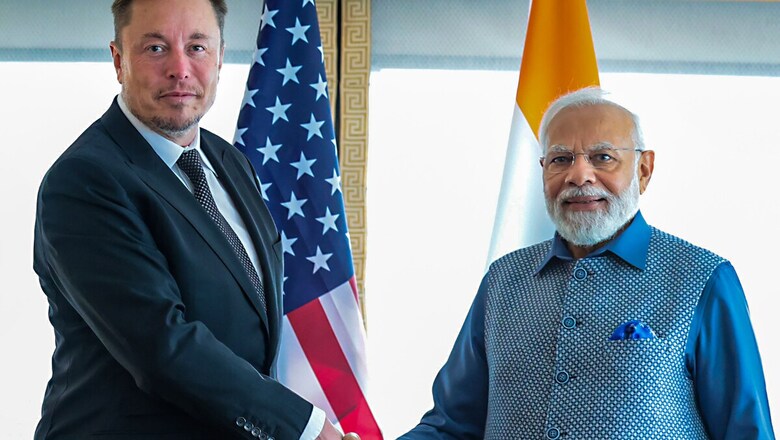
views
The demand for battery-powered electric vehicles (EVs) is slowing down in many large-scale markets globally, as consumers weigh whether to switch from petrol/diesel vehicles due to the significant premium EVs command (though the cost of operation thereafter for EVs is much lower). In this scenario, India is thinking of rolling out the red carpet to get Tesla Inc to set shop here.
According to the reports, there are significant import duty cuts to bring in fully built imported Tesla EVs besides some other concessions. The condition, though, is that Tesla would eventually begin manufacturing EVs in India, thereby boosting local sourcing of parts and enabling development of a comprehensive supply chain for EVs.
So just when the sales of EVs in the US, UK and other markets are beginning to look tepid, India is looking to step up local manufacturing of green cars. Is this a wise move?
Boosting local manufacturing is, of course, a sensible course of action, since it strengthens the Make-in-India pitch and hastens development of the ecosystem, thereby also boosting employment. Besides, with the cost of manufacturing lower in India than many developed economies, the retail price of India-built Tesla cars could be lower, thereby increasing EV sales in the domestic as well as export markets.
Tesla’s Elon Musk has often said the Indian manufacturing base would be used to export cars to other Asian markets. Another factor, which supports the wooing of Tesla by the Indian government, is that unlike in western markets, EV penetration in the domestic market is rather minuscule at just about 2%. So, there is a wide scope for expanding EV sales in India for all manufacturers.
But if the government does decide to offer significant duty concessions to Tesla for initial import of cars, it would be wise to guard against disillusionment within the domestic EV manufacturers. Some prominent ones have already said they are opposed to the quantum of concessions, despite incentives already in place for local manufacturers. These include the Production Linked Incentive schemes for various EV components, purchase incentives for various types of EVs under the FAME (Faster Adoption and Manufacturing of Electric Vehicles). The fears of local manufacturers are not unfounded and local manufacturing should certainly not suffer because Tesla promises to manufacture in India at a later date.
Tesla has been vying to enter the Indian market since 2021, when it first sought a removal of import duties on fully built car imports. At that time, the government had made it clear that unless there was commitment to local manufacturing, concessions could not be discussed. But since then, Tesla has not only doubled its component sourcing from India, it has also reportedly come around to building cars in the country. This morning, commerce and industry minister Piyush Goyal visited Tesla’s manufacturing facility at Fremont, California. It is widely believed that further headway would be made during Goyal’s visit on Tesla’s Indian plans.
As long as the government manages to woo Tesla while retaining the support of domestic makers of EVs, Tesla should be welcomed to set shop here.




















Comments
0 comment